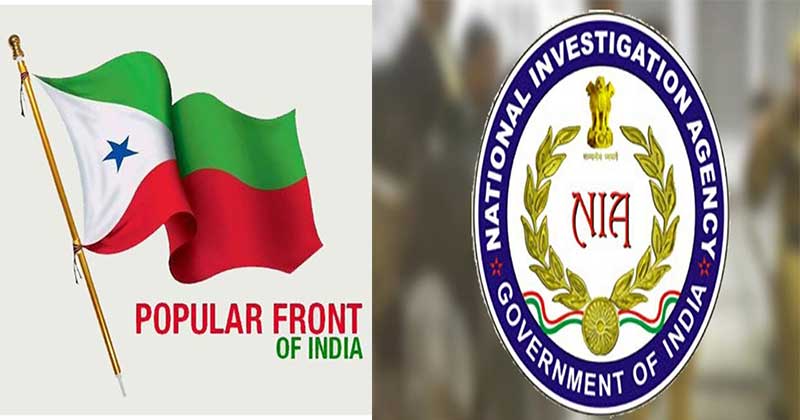Manas Dasgupta
NEW DELHI, May 31: The National Investigation Agency (NIA) sleuths simultaneously raided 16 properties allegedly belong to activists of the banned Popular Front of India (PFI) in Dakshina Kannada in connection with the ongoing investigation into terror funding.
According to sources, the search was carried out in Bantwal, Uppinangady, Venur and Belthangady. Among the places searched included few houses, shops and a hospital. Digital evidence regarding money transaction was being collected.
The search started around 4.30 a.m. Local police gave the necessary support to the sleuths. Recently NIA sleuths had raided few places in Bantwal and Puttur and had taken five persons to their custody.
The PFI had earlier claimed that ban on the orgainsation was “pre-decided” without having any evidence of its links with terror groups and it was actually was working among the Muslims to educate them against the ISIS propaganda.
The PFI, which was banned under the anti-terror Unlawful Activities (Prevention) Act (UAPA) last year, had told a UAPA tribunal in March that it had been “organising public campaigns to develop knowledge, skills and attitudes to help people build resilience against the ISIS propaganda.”
A UAPA tribunal, in an order dated March 21, had upheld the ban against the PFI and other associated organisations. One of the grounds for the Ministry of Home Affairs (MHA) to declare PFI as an “unlawful association” was its linkages with global terrorist groups such as the Islamic State in Iraq and Syria (ISIS) and Jamaat ul Mujahideen, Bangladesh (JMB).
The PFI, in its defence, submitted that in 2017, the National Investigation Agency (NIA) — while probing a 2016 case pertaining to an ISIS recruit — shared digital evidence with the defence lawyer “that the accused had plotted conspiracies against PFI leaders as they were against ISIS.”
The submissions, which were part of the UAPA tribunal order, said, “The PFI had expressed anguish and concern against killings taking place every day in the name of Islamic State in its National General Assembly held on January 24, 2016.” Anis Ahmed, an office-bearer of the PFI who is currently lodged in Tihar jail in Delhi, deposed that he had actively participated to oppose the propaganda of ISIS. He said he was a software engineer and accused the government, with the backing of the Rashtriya Swayamsevak Sangh (RSS), of misusing investigation agencies to wrongly prosecute PFI members.
He had told the tribunal that the PFI had no procedure for the documentation of memberships and no receipt or acknowledgement was issued to members. “Membership register was maintained at the local unit level. PFI does not issue any membership I-card,” Ahmed said during cross-examination. He denied the suggestion that the other eight banned organisations – Campus Front of India (CFI), Empower India Foundation (EIF), Rehab Foundation, Kerala, Rehab India Foundation, Junior Front, All India Imams Council (AIIC), National Confederation of Human Rights Organisation (NCHRO) and National Women’s Front (NWF) are associates or affiliates or fronts of the PFI.
An MHA official deposed that the September 27, 2022 notification to ban the PFI was based on information and material received from intelligence and investigating agencies of the Centre and States and the decision was passed by the Union Cabinet led by Prime Minister Narendra Modi on September 25. A Cabinet note was prepared 15 days prior.
Specific recommendations were given by three States, the official deposed. “He denied the suggestion that the timing of the ban on the PFI had been dictated in large measure by the need of the BJP to divert attention from the grave charges of corruption against the current BJP Chief Minister and his government in Karnataka,” the March 29 order had stated. The order stated that about a thousand FIRs were mentioned by the Central government in the background note and annexures, and it relied on some of the FIRs to produce material evidence in support of the ban.
Ashok Agarwal, counsel for the PFI, submitted that the evidence produced by the Central government reflected that it did not have any material with it prior to issuance of the September 27, 2022 notification and the intention to ban the organisation was “pre-decided.”
“He submitted that the Central government produced evidence of about 71 cases, out of which 35 were registered in the year 2022. Out of these 35 cases, 25 cases were registered between September 19-25, 2022 and two were registered after September 27. He submitted that seven cases are from the period between May and August 2022. The same reflected that a decision had already been taken to ban the PFI and other organisations and for this reason, to create false evidence, a flurry of cases were registered in the year 2022 with false allegations with the intention to support a ban, which was pre-decided. He submitted that these cases were registered only to justify the ban,” the order said.
Agarwal had played four videos during the hearing that were purportedly recordings of route marches of the CPI (Communist Party of India) and RSS in Kerala. He submitted that the same showed that even the cadres of the CPI and the RSS carried out marches in Kerala wearing uniforms and carrying sticks.
The AIIC informed the tribunal that it was founded in 2012 and was not associated with the PFI. It said that the AIIC encourages Imams and other leaders to study for a university degree and also pursue Islamic education. It submitted that “extremism does not know any religious or national boundaries” and it “had opposed the emergence of ISIS.”

